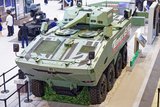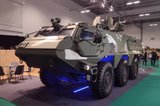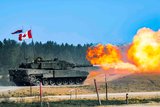RBSL details Boxer programme role
Rheinmetall BAE Systems Land (RBSL) has confirmed that it will be one of the primary vehicle manufacturers in the UK for the British Army’s Boxer vehicle programme.
Under the £2.3bn contract awarded to Artec on 5 November, the army is to receive over 500 Boxer vehicles to fulfil its Mechanised Infantry Vehicle (MIV) requirement.
RBSL will undertake fabrication of the armoured vehicle structures along with the assembly, integration, and test of the complete vehicles at its Telford facility in the West Midlands.
Peter Hardisty, managing director of RBSL, said: ‘Not only will the delivery of Boxer provide the British Army with a complete step-change in capability to meet their MIV requirement, it will also protect vital engineering and manufacturing skills as a sovereign capability to the UK. RBSL is incredibly proud to be a part of this milestone, alongside our partners in Artec.
‘RBSL has a proud heritage of working with the British Army and remains the design authority for almost all of the UK’s in-service armoured vehicle fleet. This programme builds on that relationship and marks a new chapter in vehicle manufacture for the UK defence industry.’
The British Army will receive Boxer vehicles in four variants: Infantry Carrier, Specialist Carrier, Command, and Ambulance.
Related Equipment in Defence Insight
More from Land Warfare
-
![US DoD task force’s DroneHunter acquisition lays groundwork for Replicator 2 CUAS strategy]()
US DoD task force’s DroneHunter acquisition lays groundwork for Replicator 2 CUAS strategy
As the US Department of Defense looks to counter the growing threat of uncrewed aerial systems to improve homeland security, the DroneHunter acquisition could point to future commercial innovation.
-
![Norway opts for Hanwha’s Chunmoo for long-range fires under $2 billion deal]()
Norway opts for Hanwha’s Chunmoo for long-range fires under $2 billion deal
The selection of Hanwha’s K239 Chunmoo long-range precision fires system, with a contract expected to be signed on 30 January, makes Norway the second European country to choose the system. It is expected an operational system will be in service within four years.
-
![Canada looking to expedite purchase of armoured fighting vehicle and a new tank]()
Canada looking to expedite purchase of armoured fighting vehicle and a new tank
Canada is improving its Leopard main battle tank fleet but before this is fully completed, it is expected to begin looking for new vehicles.























